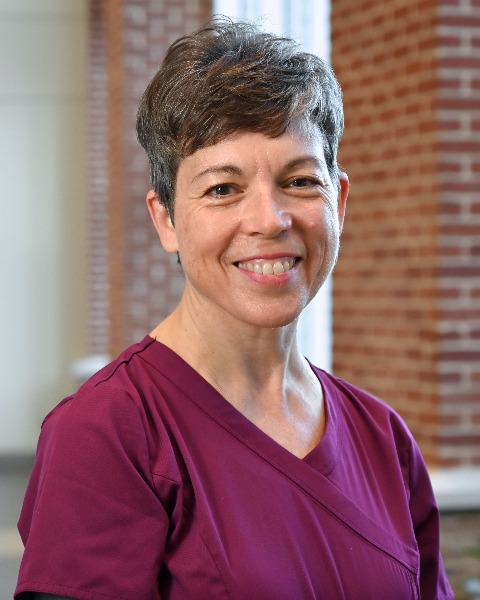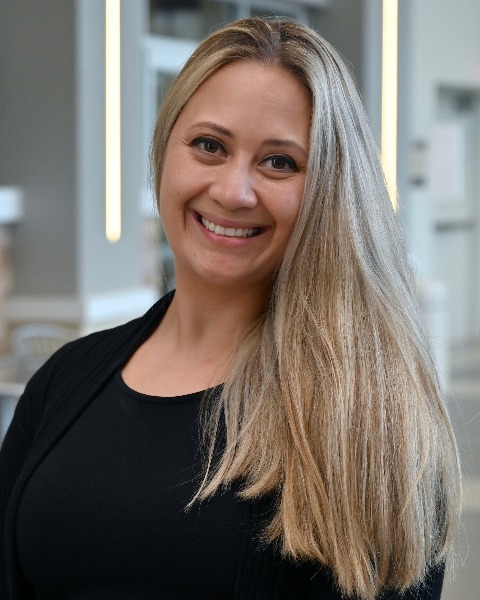Interdisciplinary Dementia Assistance Program for Long-Term Care Settings
1.00 CME / 1.00 CMD Management / 1.00 MOC
An Interdisciplinary Dementia Assistance Program addresses the need for person-centered care education to improve patient quality of life and staff experience. The speakers will provide initial training and techniques to help staff address challenging behaviors from residents living with dementia, discuss the importance of staff motivation for their work, and incorporate ways of returning purpose and meaning to the lives of residents living with dementia. Additionally, speakers will share how these techniques along with anticipatory guidance and advance care plans that reflect what matters to the patient, and can prevent unnecessary and hazardous transfers to the ER or over-use of antipsychotic medications.
Presenters
 Lisa Bromfield, MSN, RN, is a Resource Nurse Educator for the Supportive and Geriatric Care Team, a part of the larger Frederick Health System. Ms. Bromfield brings her wide ranging work experience as a nurse, a special education teacher and a professional musician to her presentations. Her experience with special needs students, geriatric and adolescent psychiatric patients, the family dynamics involved in planning and holding weddings and busy settings like the ER provided her many experiences helping people learn about and affect their own behavior and respond positively to the behavior of those around them. She has spoken for Hood College, Showing Up for Racial Justice, Frederick Health Bridges Program, The Health & Human Services Collaborative of the Panhandle (WV), The Human Anatomy & Physiology Society, students at The George Washington University and Shepherd College, and multiple long term care facilities in Frederick, MD.
Lisa Bromfield, MSN, RN, is a Resource Nurse Educator for the Supportive and Geriatric Care Team, a part of the larger Frederick Health System. Ms. Bromfield brings her wide ranging work experience as a nurse, a special education teacher and a professional musician to her presentations. Her experience with special needs students, geriatric and adolescent psychiatric patients, the family dynamics involved in planning and holding weddings and busy settings like the ER provided her many experiences helping people learn about and affect their own behavior and respond positively to the behavior of those around them. She has spoken for Hood College, Showing Up for Racial Justice, Frederick Health Bridges Program, The Health & Human Services Collaborative of the Panhandle (WV), The Human Anatomy & Physiology Society, students at The George Washington University and Shepherd College, and multiple long term care facilities in Frederick, MD.
 Sarah Oliveira, MSN, FNP-C (she/her), is a Nurse Practitioner at Frederick Health Medical Group's outpatient Supportive and Geriatric Care program. She is a Certified Dementia Practitioner through National Council of Certified Dementia Practitioners (NCCDP). She is a student in Old Dominion University's Doctorate of Nursing Practice program and focusing her research on advance care planning in the older adult population. She is a military spouse and shares a passion with her colleagues for overcoming health care disparities in the community by focusing on "What Matters" to each individual she serves.
Sarah Oliveira, MSN, FNP-C (she/her), is a Nurse Practitioner at Frederick Health Medical Group's outpatient Supportive and Geriatric Care program. She is a Certified Dementia Practitioner through National Council of Certified Dementia Practitioners (NCCDP). She is a student in Old Dominion University's Doctorate of Nursing Practice program and focusing her research on advance care planning in the older adult population. She is a military spouse and shares a passion with her colleagues for overcoming health care disparities in the community by focusing on "What Matters" to each individual she serves.
Learning Objectives
- List two techniques for helping a resident displaying challenging behaviors related to dementia.
- Recognize the difference between connecting and correcting with a resident.
- List at least one phrase that is a fall back when unsure how to handle challenging behaviors.
- Identify one way to help staff be composed or feel centered on difficult days or in difficult situations.
Credit Information
Activity Created 3/2022
Credits Available Until 3/2025
Credit Statements:
CME: AMDA – The Society for Post-Acute and Long-Term Care Medicine designates this enduring material for a maximum of 1.0 AMA PRA Category 1 Credit(s)TM. Physicians should only claim credit commensurate with the extent of their participation in the activity.
AMDA – The Society for Post-Acute and Long-Term Care Medicine for Post-Acute and Long-Term Care Medicine is accredited by the Accreditation Council for Continuing Medical Education (ACCME) to provide continuing medical education for physicians.
CMD: This self-study activity has been pre-approved by the American Board of Post-Acute and Long-Term Care Medicine (ABPLM) for a total of 1.0 management hours toward certification or recertification as a Certified Medical Director (CMD) in post-acute and long-term care medicine. The CMD program is administered by the ABPLM. Each physician should claim only those hours of credit actually spent on the activity.
ABIM Maintenance of Certification (MOC): Successful completion of this CME activity, which includes participation in the evaluation component, enables the participant to earn up to 1.0 Medical Knowledge MOC points and patient safety credit in the American Board of Internal Medicine’s (ABIM) Maintenance of Certification (MOC) program.
Participants will earn MOC points equivalent to the amount of CME credits claimed for the activity. It is the CME activity provider’s responsibility to submit participant completion information to ACCME for the purpose of granting ABIM MOC credit.
Visit the Continuing Education page for information on if and how you can claim credit/hours for AMDA’s education.
Disclosure Information:
The Society requires the disclosure of all speaker/faculty/planner’s relevant financial relationships; presence of off-label use of a device or medication; and discussion of any experimental, new or evolving topic prior to each accredited education activity.
If the learner perceives any bias toward a commercial product or service, advocation of unscientific approaches to diagnosis or therapy, or recommendation, treatment, or manners of practicing healthcare that are determined to have risks or dangers that outweigh the benefits or are known to be ineffective in the treatment of patients please report this to the Society’s staff.
All relevant financial relationships have been identified, mitigated, and resolved.
- The following AMDA Education Committee members have financial relationships to report: Diane Sanders-Cepeda, DO, CMD — UHC E&I Retiree Solutions: Full-Time Employee; all others have no relationships with ineligible companies.
- The speakers have no relevant financial relationships.
- AMDA staff have no relationships with ineligible companies.